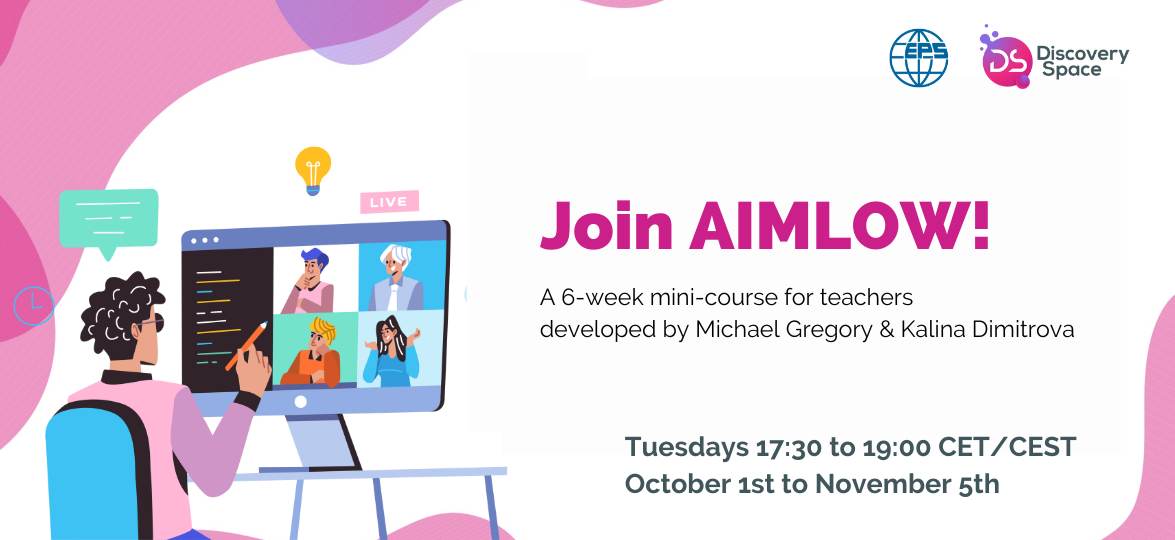The AIMLOW (Artificial Intelligence and Machine Learning Online Workshop) is a 6-week mini-course tailored for teachers, created by Michael Gregory from the European Physical Society and Discovery Space, alongside Kalina Dimitrova from Sofia University, PADME, and ALICE.
Throughout the course, you will gain an understanding of AI fundamentals and its practical applications, with a special focus on language models and image recognition technologies. You will also discover hands-on classroom activities designed to integrate these concepts into your teaching. The course will wrap up with an introduction to Discovery Space, offering educators an opportunity to explore how AI can be implemented in their schools.
Course Schedule:
Duration: October 1st to November 5th, 2024
Sessions: Tuesdays, from 17:30 to 19:00 CET/CEST
See the courses below
Course 1 | October 1st – Introduction, expectations, misconceptions
In the first session, you’ll meet your hosts, Michael Gregory and Kalina Dimitrova, and get an overview of what to expect throughout the course. We’ll outline the key learning objectives, gather your initial questions about AI, and begin addressing some of the common misconceptions and concerns surrounding
Course 2 | October 2nd – Language Models and Baby GTP
In this session, we will explore language models and predictive text generation through quick and engaging classroom activities and games that help illustrate key concepts. You’ll even get to work with our custom-built language model, “Baby GTP,” which we will train to talk using datasets chosen by participants. By training the model on a small dataset, we’ll observe some quirky yet insightful behavior, much like teaching a baby to speak. It’s a fun and educational way to understand language models by drawing parallels to a child’s first words!
The video will be available to watch here shortly.
Course 3 | October 15th – Image Recognition
Kalina’s been at it again! In addition to our trainable language model, she has developed image recognition software specifically for educational use. Drawing inspiration from her experience in large particle physics experiments, this software is designed to explain its functionality, even generating saliency maps to show the patterns it uses to identify images. To wrap up the session, we’ll guide you through the process of training an algorithm using your own image categories.
The video will be available to watch here shortly.
Course 4 | October 22nd – Image Generation
In this session, we’ll have some fun experimenting with image generation software and comparing a few free online generators, examining their strengths and limitations. Using our understanding of language models, we’ll explore how to craft effective prompts for text-to-image generators, enhancing the quality and accuracy of the images they produce.
The video will be available to watch here shortly.
Course 5 | October 29th – Application to Teaching Practice
After exploring the basic mechanics of popular AI applications, we’ll shift our focus to the classroom. We’ll discuss what the AI revolution means for educators and how teachers can leverage these technologies effectively, both now and in the future.
The video will be available to watch here shortly.
Course 6 | November 5th – Discovery Space – use the power of AI
Discovery Space is an EU-funded initiative aimed at creating an Exploratory Learning Environment that supports students in inquiry-based learning and problem-solving. Through learning scenarios that feature virtual and remote labs, students will navigate personalized learning pathways that adapt based on their input, covering a wide range of topics. Michael is leading workshops both online and across Europe to bring Discovery Space to educators, and he warmly invites you to join in for more free professional development opportunities!
For more information on Discovery Space workshops, please see here.
The video will be available to watch here shortly.
About the course leaders
Michael Gregory works for the European Physical Society as the EU-project officer for the Discovery Space Project. Michael has 16 years of classroom teaching in France, and is an Scientix and Science on Stage France Ambassador. He has trained teachers and/or performed science shows on five continents and roughly 40 countries, many of which he crossed by bicycle.
In 2023, Michael created and led the course “Particle Physics for Teachers” with guest teachers and scientists from around the world, including CERN, FermiLab, Perimeter Institute and more!
Kalina Dimitrova is currently working on her particle physics PhD at Sofia University. She is part of the PADME Collaboration at Laboratori Nationali di Frascati, Italy, and the ALICE Collaboration at CERN, Switzerland. One of her main tasks is developing machine learning algorithms for detector data analysis. She also works on AI explainability, seeking ways to find a deeper understanding of the performance of the neural networks she creates.

